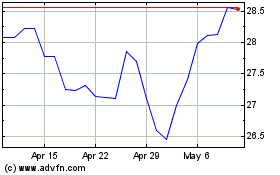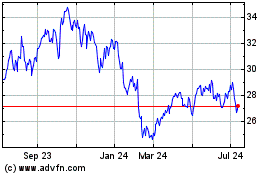Statoil Exits Production in Canadian Oil Sands -- Update
December 14 2016 - 9:13PM
Dow Jones News
By Chester Dawson
CALGARY, Alberta -- Norway's state-owned oil giant. Statoil ASA.
said Wednesday it is exiting its business in the Canadian oil
sands, selling off its assets to Athabasca Oil Corp. and taking a
loss of at least $500 million.
The move ends Statoil's nearly decadelong foray into oil sands
production and comes two years after the company canceled plans to
develop a major oil sands project, citing concerns about
profitability. It signals the challenges faced by Canada's oil
sands, which are some of the world's highest-cost and most
greenhouse gas intensive sources of crude oil.
"This transaction corresponds with Statoil's strategy of
portfolio optimization to enhance financial flexibility and focus
capital on core activities globally," Lars Christian Bacher, the
company's executive vice president for international development
and production, said in a statement.
Even with a recent uptick in crude-oil prices to above $50 a
barrel, oil sands producers in Canada have been squeezed by high
upfront investment costs, tough new regulations on carbon emissions
and limited pipeline access to markets.
Last year, Royal Dutch Shell canceled a major oil sands project
and took a $2 billion write-down. In October, Exxon Mobil said it
may remove billions of barrels of oil sands crude from its books,
citing low oil prices.
The deal includes Statoil's 100% ownership of two key oil sands
leases, a 24,000 barrel a day test project called Leismer and an
undeveloped project known as Corner. Statoil indefinitely postponed
plans in September of 2014 to develop Corner, which was expected to
produce 40,000 barrels of oil a day.
The 832 million Canadian dollars ($626 million) deal is
structured to give Statoil a nearly 20% stake in Athabasca.
That Calgary-based company said the Leismer project can
break-even on an operating income basis with West Texas
Intermediate crude prices as low as $44 a barrel. "Athabasca has
the financial strength to drive oil-weighted growth at competitive
metrics in the current environment," CEO Robert Broen said in a
statement.
The government of Alberta, where Canada's oil sands are
concentrated, said it welcomed Athabasca's acquisition of Statoil's
assets. "We are pleased to see that a strong Alberta-based company
has taken over these assets and we look forward to the continued
development of our oil sands, " said Brad Hartle, a spokesman for
the province's energy minister.
Statoil entered the oil sands in 2007 when it bought North
American Oil Sands Corp. in a deal then valued at $C2.2 billion. It
then sold a 40% stake to Thailand's state-run PTT Exploration and
Production Public Co., or PTTEP, which spun off those assets into a
separate entity in 2014.
The sale of its remaining operations to Athabasca will trigger a
balance sheet impairment of $500 million to $550 million, Statoil
said.
Environmental critics that have long pressured Statoil to divest
its oil sands holdings hailed the decision. "This is a victory for
common sense, " said Keith Stewart, the head of Greenpeace Canada's
climate and energy campaign. "Any serious attempt to meet the Paris
climate commitments will turn this kind of high carbon oil into a
stranded asset," he said.
Oil sands wells like those at Leismer are more costly and
energy-intensive than shale or conventional oil wells. They require
steam injections to leach out underground deposits of oil embedded
in sand. Natural gas is burned to generate steam at a rate of about
1000 cubic feet per barrel of crude.
The process, called steam-assisted gravity drainage, or SAGD,
has exposed the oil sands industry to higher carbon taxes and an
absolute cap on greenhouse gas emissions introduced by Alberta's
new left-leaning government.
The Norwegian oil giant said its offshore operations in Canada
wouldn't be affected by the sale of its oil sands assets. Statoil
has minority stakes in two producing assets off the coast of
Newfoundland and two developmental projects.
Statoil's business in North American also includes shale oil
production in the Eagle Ford formation of Texas and North Dakota's
Bakken Shale, as well as Marcellus basin shale gas on the U.S. east
coast and Gulf of Mexico operations.
Write to Chester Dawson at chester.dawson@wsj.com
(END) Dow Jones Newswires
December 14, 2016 20:58 ET (01:58 GMT)
Copyright (c) 2016 Dow Jones & Company, Inc.
Equinor ASA (NYSE:EQNR)
Historical Stock Chart
From Mar 2024 to Apr 2024

Equinor ASA (NYSE:EQNR)
Historical Stock Chart
From Apr 2023 to Apr 2024
